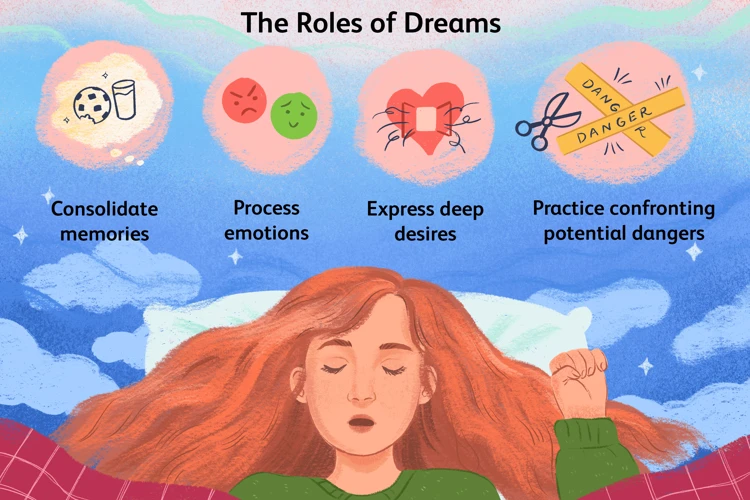Have you ever woken up from a nightmare in the middle of the night, feeling terrified and unable to fall back asleep? Nightmares can have a significant impact on your sleep quality, leading to a host of negative consequences. Understanding the relationship between nightmares and sleep is crucial for finding effective solutions to ensure a good night’s rest. In this article, we delve into the definition and causes of nightmares, explore how they affect sleep quality, discuss the consequences of poor sleep, and provide practical tips for improving sleep quality. So, if you’re tired of tossing and turning at night due to nightmares, read on to discover how you can regain control over your sleep and wake up feeling refreshed and rejuvenated.
Understanding Nightmares

When it comes to understanding nightmares, it’s important to explore their definition and potential causes. Nightmares are intense, vivid dreams that evoke negative emotions, such as fear, anxiety, or sadness. They often occur during the rapid eye movement (REM) stage of sleep, which is when our most vivid dreams take place. While nightmares can be a normal part of dream experiences, they can also be indicators of underlying psychological or emotional issues. Causes of nightmares can vary from person to person, but common factors include stress, anxiety, trauma, medications, sleep disorders, and even certain foods. In some cases, recurring nightmares may be linked to unresolved trauma or subconscious fears from past experiences. Understanding the nature of recurring nightmares can provide valuable insights into their potential connections to past trauma or subconscious fears. Interpreting and exploring the themes and symbols in nightmares can also provide deeper understanding of our emotional state and help us address underlying issues. By unraveling the mysteries of nightmares, we can gain valuable insights into our innermost thoughts and emotions that manifest during our sleep.
Definition of Nightmares
|
The definition of nightmares encompasses intense, distressing dreams that are vivid and often evoke negative emotions. They can be characterized by a variety of disturbing and frightening elements, including but not limited to:
What distinguishes nightmares from regular dreams is the level of fear and distress they elicit. Upon waking up from a nightmare, individuals may experience a rapid heartbeat, sweating, or feelings of anxiety that can linger even after they have fully awakened. Nightmares typically occur during the rapid eye movement (REM) stage of sleep, which is when our brain activity is high and most intense dreaming occurs. However, they can also occur during other sleep stages. While the exact purpose of nightmares is still unclear, some theories suggest that they serve as a way for our brains to process emotions, memories, and fears. By exploring the themes and symbols present in nightmares, individuals can gain a better understanding of their innermost thoughts, fears, and anxieties. For some individuals, nightmares can become recurring, causing distress and disrupting sleep on a regular basis. In these cases, it may be helpful to explore the potential links between recurring nightmares and past trauma. Additionally, interpreting nightmares and understanding subconscious fears can provide valuable insights into the underlying psychological factors contributing to their occurrence. |
Causes of Nightmares
Understanding the causes of nightmares can help shed light on why they occur and how to address them effectively. While each individual’s experience with nightmares may vary, several common factors have been identified as potential triggers:
- Stress and Anxiety: High levels of stress and anxiety can disrupt the normal sleep cycle and contribute to more frequent nightmares. Emotional turmoil, work pressure, relationship problems, or traumatic events can all increase the likelihood of experiencing nightmares.
- Trauma and PTSD: Nightmares are often reported by individuals who have experienced past traumatic events or are living with post-traumatic stress disorder (PTSD). Trauma-related nightmares can be a way for the brain to process and attempt to make sense of the trauma.
- Medications and substances: Certain medications, including antidepressants, sedatives, and blood pressure medications, have been known to induce nightmares as a side effect. Additionally, substance abuse or withdrawal from drugs or alcohol can also lead to nightmares.
- Sleep disorders: Conditions like sleep apnea, restless leg syndrome, and insomnia can disrupt the sleep cycle and increase the likelihood of experiencing nightmares. Sleep deprivation or irregular sleep patterns can also contribute to more frequent nightmares.
- Eating and Drinking Habits: Consuming certain foods before bed, such as spicy or heavy meals, or consuming caffeine or alcohol late in the day, can interfere with sleep and contribute to nightmares.
It’s important to note that these are just some of the potential causes of nightmares. The specific triggers can vary from person to person, and it’s essential to pay attention to individual circumstances and experiences. Identifying and addressing the underlying causes of nightmares is a crucial step in managing and reducing their frequency.
The Relationship Between Nightmares and Sleep Quality

The relationship between nightmares and sleep quality is intricate and intertwined. Nightmares can significantly affect the overall sleep duration by disrupting the normal sleep cycle. When we experience a nightmare, it often jolts us awake, leaving us feeling anxious and afraid. This sudden awakening can lead to difficulty falling back asleep or result in shorter periods of sleep throughout the night. Additionally, nightmares have a direct impact on REM sleep, which is essential for our overall sleep quality. During REM sleep, our brains are highly active, and this is when we typically have our most vivid dreams. However, when nightmares occur during REM sleep, they can disrupt the sleep cycle and prevent us from experiencing the restorative effects of deep sleep. As a result, the overall sleep quality is compromised, leaving us feeling tired, groggy, and restless upon waking. Understanding the relationship between nightmares and sleep quality is crucial in finding ways to improve sleep and address the underlying causes of these distressing dreams.
Effects on Sleep Duration
Nightmares can have a significant impact on sleep duration. When we experience a nightmare during the night, it often leads to disrupted sleep patterns. We may find ourselves waking up frequently throughout the night, unable to fall back asleep due to the fear or anxiety caused by the nightmare. This can result in a shortened overall sleep duration. Additionally, the emotional intensity of nightmares can make it difficult to achieve a deep and restful sleep. As a result, even if we do manage to fall back asleep after a nightmare, the quality of our sleep may be compromised, leading to a feeling of being unrested and fatigued in the morning.
Here are some ways in which nightmares can affect sleep duration:
- Frequent awakenings: Nightmares can cause us to wake up multiple times during the night, interrupting the natural sleep cycle.
- Difficulty falling back asleep: The fear or anxiety triggered by nightmares can make it challenging to quickly fall back asleep after waking up.
- Prolonged arousal: Nightmares can lead to a heightened state of arousal, making it difficult for us to relax and return to a deep sleep.
It’s important to note that recurring nightmares or chronic sleep disruptions can have long-term effects on overall sleep quality and duration. Consistently experiencing nightmares and subsequent sleep disturbances can lead to a chronic sleep deficit, which can impact our physical and mental well-being. Addressing the underlying causes of nightmares and finding strategies to improve sleep quality can help restore a healthy sleep duration and ensure we wake up feeling refreshed.
Disrupting REM Sleep
REM sleep plays a crucial role in our sleep cycle, and when it is disrupted by nightmares, it can have profound effects on our overall sleep quality. Here are some key insights into how nightmares can disrupt REM sleep:
- Extended REM periods: Nightmares can cause extended periods of REM sleep, as the brain becomes highly active during these vivid dreams. This can reduce the overall time spent in other stages of sleep, such as deep sleep, leading to a fragmented and less restorative sleep experience.
- Frequent awakenings: Nightmares often trigger awakenings during the night, causing us to abruptly wake up and interrupt the natural progression of sleep cycles. These awakenings can lead to difficulty falling back asleep, further disrupting the continuity of our sleep.
- Increased heart rate and arousal: Nightmares can induce physiological arousal, including an elevated heart rate, rapid breathing, and sweating. These physical responses are characteristic of the body’s fight-or-flight response, which can be highly disruptive to a peaceful sleep state.
- Emotional and mental stimulation: Nightmares can provoke intense emotional and cognitive stimulation, making it difficult for the mind and body to relax and enter a deep sleep state. The fear and anxiety experienced during nightmares can linger even after waking up, making it challenging to return to a state of calm and relaxation.
It is important to note that while nightmares can disrupt REM sleep, suppressing or avoiding dreams altogether is not the solution. Dreams, including nightmares, serve important functions in processing emotions and memories. Instead, finding effective strategies to manage and reduce the frequency and intensity of nightmares can promote better sleep quality and overall well-being.
Consequences of Poor Sleep Quality

Poor sleep quality, often caused by frequent nightmares, can have a range of detrimental consequences on various aspects of our lives. One of the most immediate effects of inadequate sleep is daytime fatigue and sleepiness. When we don’t get enough restorative sleep due to nightmares, we wake up feeling tired and groggy, making it difficult to concentrate and stay alert throughout the day. This can negatively impact our productivity, performance at work or school, and overall quality of life. Additionally, irritability and mood changes are common consequences of poor sleep. Sleep deprivation can make us more prone to irritability, mood swings, and heightened emotional responses, which can strain relationships and impair our ability to cope with stress. Another significant consequence is the impact on cognitive function. Lack of restful sleep impairs memory, attention, and decision-making abilities, making it harder to learn and retain information. It can also increase the risk of accidents and lower overall cognitive performance. Clearly, improving sleep quality is vital to maintaining optimal physical and mental well-being.
Daytime Fatigue and Sleepiness
- Reduced Energy Levels: One of the most noticeable consequences of poor sleep quality due to nightmares is daytime fatigue and sleepiness. When we experience nightmares during the night, it can disrupt our sleep patterns and prevent us from getting the restorative sleep our bodies need. As a result, we wake up feeling exhausted and lacking energy to tackle the day’s tasks.
- Impaired Cognitive Function: Daytime fatigue and sleepiness can also have a significant impact on our cognitive function. When we are sleep deprived, our ability to concentrate, focus, and make decisions is compromised. This can hinder our productivity at work or school and make it difficult to perform well in daily activities.
- Increased Risk of Accidents: Sleepiness and fatigue caused by nightmares can also increase the risk of accidents. Whether it’s falling asleep at the wheel while driving or experiencing lapses in attention during potentially dangerous tasks, impaired alertness can pose serious safety risks to both ourselves and those around us.
- Mood Changes and Irritability: Poor sleep quality can negatively impact our mood and emotional well-being. When we don’t get enough restful sleep due to nightmares, it can lead to irritability, mood swings, and increased negative emotions. This can strain our relationships with others and make it challenging to regulate our emotions effectively.
- Reduced Overall Quality of Life: Ultimately, the daytime fatigue and sleepiness caused by nightmares can have a cumulative effect on our overall quality of life. It can diminish our enjoyment of daily activities, affect our relationships and productivity, and contribute to feelings of dissatisfaction and unhappiness.
Irritability and Mood Changes
Irritability and mood changes are common consequences of poor sleep quality caused by nightmares. When we experience frequent nightmares or have disturbed sleep due to fear or anxiety, it can have a significant impact on our emotional well-being. Sleep disruptions can lead to feelings of irritability, making us more prone to snapping at others or being short-tempered. We may find ourselves easily frustrated by minor inconveniences and have difficulty managing stress. Additionally, the emotional intensity of nightmares can linger into our waking hours, causing shifts in mood throughout the day. We may feel more anxious, depressed, or on edge, struggling to maintain a positive outlook. These mood changes can also make it challenging to concentrate, engage in activities we enjoy, or effectively interact with others. It’s important to address the underlying causes of nightmares and prioritize improving sleep quality to alleviate irritability and mood changes. By implementing effective strategies for managing nightmares and getting restful sleep, we can restore emotional balance and enhance our overall well-being.
Impact on Cognitive Function
The impact of nightmares on cognitive function can be significant. When we experience poor sleep due to nightmares, it can impair our cognitive abilities and overall mental functioning. Sleep plays a crucial role in consolidating memories, enhancing learning, and promoting optimal cognitive performance. However, continuous disruptions in sleep caused by nightmares can interfere with these processes.
One of the primary ways nightmares affect cognitive function is through the disruption of REM sleep. REM sleep is closely linked to memory and learning processes. It is during this stage of sleep that our brain consolidates and processes information from the day, storing it in long-term memory. When nightmares intrude upon REM sleep, it can disrupt this consolidation process, leading to difficulties in memory formation and retention.
In addition to memory issues, poor sleep quality resulting from nightmares also impairs our ability to focus and concentrate. It can lead to decreased attention span, reduced alertness, and slower cognitive processing speed. This can have a significant impact on daily tasks and performance, such as at work or in academic settings.
Nightmares can contribute to emotional distress, which further hampers cognitive function. When we wake up from a terrifying nightmare, it can leave us feeling anxious, stressed, or emotionally drained. These negative emotions can linger throughout the day, affecting our ability to think clearly and make rational decisions.
It’s important to address the impact of nightmares on cognitive function and seek solutions for better sleep quality. By reducing the frequency and intensity of nightmares, we can protect our cognitive abilities, enhance memory consolidation, and improve overall mental performance. Taking steps to improve sleep hygiene and manage stress can help alleviate nightmares and promote healthier cognitive function.
Improving Sleep Quality
To improve your sleep quality and reduce the occurrence of nightmares, there are several strategies you can implement. First, establish a consistent bedtime routine that allows your body and mind to unwind before sleep. This can include activities like reading a book, taking a warm bath, or practicing relaxation techniques. Creating a sleep-friendly environment is also essential by ensuring your bedroom is dark, quiet, and cool. Consider using earplugs, eye masks, or white noise machines to promote a more peaceful sleep environment. Managing stress and anxiety plays a crucial role in improving sleep quality, so finding healthy coping mechanisms like exercise, meditation, or journaling can help reduce the frequency of nightmares. If nightmares persist and significantly impact your sleep, it may be beneficial to seek professional help from a healthcare provider or therapist who specializes in sleep disorders or trauma. By taking proactive steps to improve your sleep quality, you can minimize the impact of nightmares and wake up feeling refreshed and rejuvenated.
Establishing a Bedtime Routine
One effective way to improve sleep quality and reduce the occurrence of nightmares is by establishing a bedtime routine. By following a consistent routine before going to bed, you can signal to your body and mind that it’s time to wind down and relax. Start by setting a regular sleep schedule, going to bed and waking up at the same time every day, even on weekends. This helps regulate your body’s internal clock and promotes better sleep. Prioritize activities that promote relaxation and calmness, such as reading a book, taking a warm bath, or practicing mindfulness or meditation. Avoid stimulating activities, bright screens, and caffeine in the hours leading up to bedtime, as they can interfere with your ability to fall asleep and increase the likelihood of nightmares. Creating a comfortable sleep environment is also crucial. Make sure your bedroom is cool, dark, and free from distractions. Use comfortable bedding and consider using white noise or a sleep-inducing scent to enhance relaxation. By establishing a consistent bedtime routine, you can create a sleep-friendly environment and improve your chances of having a restful and nightmare-free night’s sleep.
Creating a Sleep-Friendly Environment
When it comes to creating a sleep-friendly environment, there are several factors to consider that can greatly enhance the quality of your sleep. One of the most important elements is to establish a comfortable and inviting sleep environment. Start by making sure your bedroom is cool, dark, and quiet. A cooler room temperature, around 65 to 70 degrees Fahrenheit, promotes better sleep. Consider using blackout curtains or an eye mask to block out any unwanted light that may interfere with your sleep. Additionally, invest in a good quality mattress and pillows that provide adequate support and comfort for your body. This can help alleviate any discomfort or pain that may disrupt your sleep. Another key factor in creating a sleep-friendly environment is minimizing noise disruptions. Consider using earplugs or a white noise machine to drown out any external noises that may disturb your sleep. Removing electronic devices, such as laptops or smartphones, from your bedroom can help create a more peaceful atmosphere and reduce the temptation to engage in stimulating activities before bed.
Managing Stress and Anxiety
Managing stress and anxiety plays a crucial role in improving sleep quality and reducing the occurrence of nightmares. Here are some strategies and techniques to help you effectively manage stress and anxiety:
- Practice relaxation techniques: Engaging in relaxation techniques before bed can help calm the mind and body, making it easier to fall asleep and reduce the likelihood of nightmares. Deep breathing exercises, progressive muscle relaxation, and guided imagery are effective relaxation techniques to try.
- Establish a bedtime routine: Creating a consistent bedtime routine can signal to your body that it’s time to unwind and prepare for sleep. Incorporate activities that promote relaxation, such as reading a book, taking a warm bath, or listening to soothing music.
- Implement stress management techniques: Find healthy ways to manage stress during the day to prevent it from carrying over into your sleep. This can include activities such as regular exercise, journaling, practicing mindfulness or meditation, or engaging in hobbies that bring you joy and relaxation.
- Avoid stimulating activities before bed: Limit exposure to screens, such as smartphones, tablets, and TVs, in the hours leading up to bedtime. The blue light emitted by these devices can interfere with the production of melatonin, a hormone that regulates sleep. Instead, engage in calming activities like reading a book or listening to soft music.
- Seek support: If stress and anxiety continue to significantly impact your sleep and quality of life, consider seeking support from a mental health professional. They can provide valuable guidance and support in managing stress and anxiety, which can ultimately lead to better sleep and a reduction in nightmares.
By incorporating these strategies into your daily routine, you can effectively manage stress and anxiety, creating a more peaceful and restful sleep environment. Taking the time to address these underlying causes can ultimately contribute to better sleep quality and a decreased frequency of nightmares.
Seeking Professional Help
Seeking professional help is a crucial step in addressing nightmares and improving sleep quality. If nightmares persist and significantly impact your daily life, it may be beneficial to consult with a healthcare professional or sleep specialist. They can conduct a thorough evaluation to determine the underlying causes of your nightmares and provide appropriate treatment options. One common approach is cognitive-behavioral therapy for nightmares (CBT-N), which aims to identify and modify negative thought patterns and behaviors associated with nightmares. A trained therapist can guide you through techniques such as image rehearsal therapy (IRT), where you rehearse a new, positive dream scenario to replace the recurring nightmares. In some cases, medication may be prescribed for short-term relief or to address underlying conditions contributing to nightmares. Remember, reaching out to a professional can provide you with the necessary support and guidance to regain control over your sleep and improve your overall well-being.
Conclusion
Overall, it is clear that the impact of nightmares on sleep quality cannot be underestimated. Nightmares can disrupt sleep duration and interfere with the crucial REM sleep stage, leading to poor sleep quality. This, in turn, can result in daytime fatigue, irritability, mood changes, and cognitive impairment. However, there are steps that can be taken to improve sleep quality and mitigate the effects of nightmares. Establishing a consistent bedtime routine, creating a sleep-friendly environment, and implementing stress and anxiety management techniques can all contribute to a better night’s sleep. It is also important to seek professional help if nightmares persist or significantly impact daily functioning. By addressing the causes and consequences of nightmares, individuals can regain control over their sleep and overall well-being. So, don’t let nightmares continue to disrupt your sleep; take action today to promote better sleep quality and wake up feeling refreshed and rejuvenated.
Frequently Asked Questions
What is considered a nightmare?
A nightmare is a vivid and disturbing dream that evokes negative emotions, such as fear, anxiety, or sadness. It often involves intense and frightening scenarios that can leave a person feeling unsettled upon waking.
Are nightmares a common occurrence?
Yes, nightmares are a common experience for many individuals. It is estimated that around 50% of adults have occasional nightmares, while about 5% to 8% experience recurring nightmares.
What causes nightmares?
Nightmares can be caused by various factors, including stress, anxiety, trauma, medications, sleep disorders, and even certain foods. Additionally, underlying health conditions and unresolved emotional issues may contribute to the occurrence of nightmares.
Can nightmares affect sleep quality?
Yes, nightmares can significantly impact sleep quality. They can disrupt both the duration and quality of sleep, leading to increased sleep fragmentation and restless nights.
How do nightmares affect sleep duration?
Nightmares can lead to fragmented sleep, causing frequent awakenings throughout the night. This can result in a decreased overall sleep duration and leave individuals feeling tired and unrested.
Do nightmares disrupt REM sleep?
Yes, nightmares commonly occur during the rapid eye movement (REM) stage of sleep, which is when our most vivid dreams take place. The intense emotions experienced during nightmares can disrupt REM sleep, leading to disturbances in the sleep cycle.
What are the consequences of poor sleep quality?
Poor sleep quality can have a range of negative consequences. It can contribute to daytime fatigue, sleepiness, irritability, mood changes, and difficulties with cognitive function, such as memory and concentration.
How can I improve my sleep quality?
To improve sleep quality, establishing a bedtime routine, creating a sleep-friendly environment, managing stress and anxiety, and seeking professional help if necessary can all be beneficial. These strategies can help promote better sleep and reduce the frequency of nightmares.
Is seeking professional help necessary for dealing with nightmares?
While occasional nightmares are usually harmless and can be managed with self-care techniques, if nightmares persist and significantly impact your daily life, it may be beneficial to seek professional help. Mental health professionals can provide guidance and support in addressing any underlying issues contributing to nightmares.
Can interpreting nightmares help in understanding oneself?
Yes, interpreting nightmares and exploring the themes and symbols within them can provide valuable insights into one’s emotional state and innermost thoughts. It can help individuals gain a better understanding of their fears, desires, and unresolved conflicts, leading to personal growth and self-awareness.








